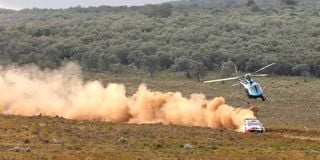Safari Rally format dominates global conversations

Tooya MSport's Sebastien Ogier navigated by Vincent Landais competes in Hell's Gate stage of the 2023 WRC Safari Rally on June 25, 2023.
What you need to know:
- Meanwhile, the WRC Safari Rally Secretariat working group didn’t break for Christmas as it stares into a workflow overloaded by the WMSC which brought the Safari forward by three months upon a request by President William Ruto and Sports CS Ababu Namwamba to re-create the East weekend Safari rally feel of old.
How about a five or even six-day Safari Rally in the future? While such a suggestion is obviously out of question, for now, this is something some quarters have proposed to make the Safari unique, and tempting, just as it used to be, a sort of revival and rewinding the clock.
The rains will play an important role in this year’s World Rally Championship Safari Rally from March 28 to 31, only 87 days away, in determining the winners and losers.
This following a short glimpse in Soysambu when passing flash floods exposed the under belly of the technological wonder hybrid Rally1 machines which were frustrated by flooded and wet road conditions.
Rains are unpredictable and they can play havoc like in last month’s East African Safari Classic Rally, a bane too for drivers and eye-pleasing for the fans.
If the weatherman is to be believed, then there are high prospects of an extremely wet Safari. The weatherman has already warned that the long rains will kick in from March.
Many stakeholders internationally view the Safari as the best thing to have happened to the WRC since its return to the series in 2021.
But one of the most radical proposals is by Belgian rally star Thierry Neuville who came close to winning the Safari in 2021 before hell broke loose with a mechanical breakdown in his Hyundai I20 WRC when the finish line was within his sight.
Neuville is proposing a five or six-day Safari as a way of bringing back the old ingredients of endurance, tactical approach and proper mechanical pre-event preparations.
All the three were lost in 1996 when Tommi Makinen demolished this myth in a gun-to-tape sprint for four days as if he was doing an European event when everybody as tradition demanded adopted a “wait and see” attitude.
The Mitsubishi Ralliart Team, under the late Andrew Cowan, adopted a strategy of replacing main parts, including shock absorbers, at each service in order to pre-emptively avoid problems, one of the many tactics Mitsubishi learnt to win, outright, the 1974/76 Safari Rally editions.
Neuville also wants longer stages which completing even a single one when some were over 100-kilometre long, one was a herculean task.
“However, to not completely change the rally format, I would keep Monte Carlo as a four-day event, and I would make the Safari Rally longer to be like five or six days long, but with longer stages to create a bit of excitement like in the past,” he was quoted saying on the Motoring News website.
The WRC clover leaf format of three-day action — where day one was a repeat of day three — and the introduction of a centralised service park, introduced in 1996, has already served its purpose and it’s time for change.
Overall, some drivers are proposing a reduction in overall distance of the WRC from the current 350km or so to 250km and only two days of racing.
This was rejected outrightly by the sport’s supreme decision making organ, the World Motorsport Council (WMSC), last month in Baku, Azerbaijan, but the discussions of changes continue.
The WMSC has tapped into the expertise of Dave Richards, the man who was one of the proponents of those changes to make rallying more television friendly, and FIA Vice President for Sports Robert Reid to propose more changes in the WRC in a technology-driven future.
Asked for his opinion on the future of the WRC format, Neuville revealed he would like to see more variety in the length of rallies and the return of iconic events of the past.
“I would then have a Sunday [at some events] where we do one stage but repeated and maybe have a remote service [near the stage], so people can come to the service and then walk to the stage and see us twice and have some interaction with us [the drivers].
“There could be co-driver runs for manufacturers with VIPs. This would bring the rally to the people.”
Meanwhile, the WRC Safari Rally Secretariat working group didn’t break for Christmas as it stares into a workflow overloaded by the WMSC which brought the Safari forward by three months upon a request by President William Ruto and Sports CS Ababu Namwamba to re-create the East weekend Safari rally feel of old.
Short as it is, the WMSC decision was a mark of confidence with the working group to deliver a world class event.





